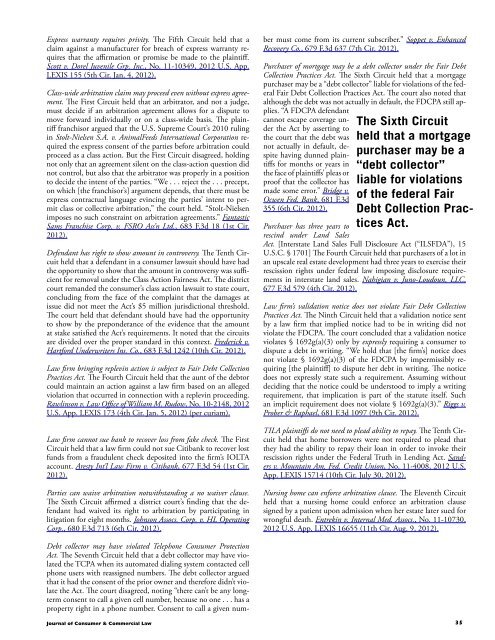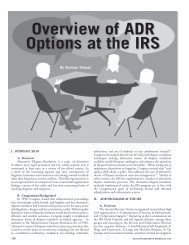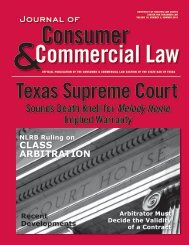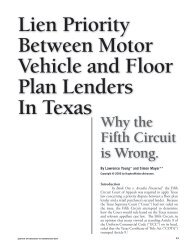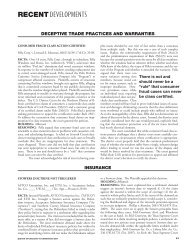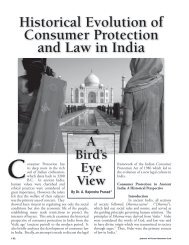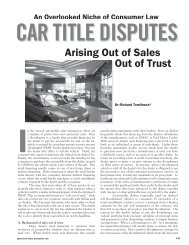Teaching Consumer Credit Law in an Evolving Australian Economy
Teaching Consumer Credit Law in an Evolving Australian Economy
Teaching Consumer Credit Law in an Evolving Australian Economy
Create successful ePaper yourself
Turn your PDF publications into a flip-book with our unique Google optimized e-Paper software.
Express warr<strong>an</strong>ty requires privity. The Fifth Circuit held that a<br />
claim aga<strong>in</strong>st a m<strong>an</strong>ufacturer for breach of express warr<strong>an</strong>ty requires<br />
that the affirmation or promise be made to the pla<strong>in</strong>tiff.<br />
Scott v. Dorel Juvenile Grp. Inc., No. 11-10349, 2012 U.S. App.<br />
LEXIS 155 (5th Cir. J<strong>an</strong>. 4, 2012).<br />
Class-wide arbitration claim may proceed even without express agreement.<br />
The First Circuit held that <strong>an</strong> arbitrator, <strong>an</strong>d not a judge,<br />
must decide if <strong>an</strong> arbitration agreement allows for a dispute to<br />
move forward <strong>in</strong>dividually or on a class-wide basis. The pla<strong>in</strong>tiff<br />
fr<strong>an</strong>chisor argued that the U.S. Supreme Court’s 2010 rul<strong>in</strong>g<br />
<strong>in</strong> Stolt-Nielsen S.A. v. AnimalFeeds International Corporation required<br />
the express consent of the parties before arbitration could<br />
proceed as a class action. But the First Circuit disagreed, hold<strong>in</strong>g<br />
not only that <strong>an</strong> agreement silent on the class-action question did<br />
not control, but also that the arbitrator was properly <strong>in</strong> a position<br />
to decide the <strong>in</strong>tent of the parties. “We . . . reject the . . . precept,<br />
on which [the fr<strong>an</strong>chisor’s] argument depends, that there must be<br />
express contractual l<strong>an</strong>guage ev<strong>in</strong>c<strong>in</strong>g the parties’ <strong>in</strong>tent to permit<br />
class or collective arbitration,” the court held. “Stolt-Nielsen<br />
imposes no such constra<strong>in</strong>t on arbitration agreements.” F<strong>an</strong>tastic<br />
Sams Fr<strong>an</strong>chise Corp. v. FSRO Ass’n Ltd., 683 F.3d 18 (1st Cir.<br />
2012).<br />
Defend<strong>an</strong>t has right to show amount <strong>in</strong> controversy. The Tenth Circuit<br />
held that a defend<strong>an</strong>t <strong>in</strong> a consumer lawsuit should have had<br />
the opportunity to show that the amount <strong>in</strong> controversy was sufficient<br />
for removal under the Class Action Fairness Act. The district<br />
court rem<strong>an</strong>ded the consumer’s class action lawsuit to state court,<br />
conclud<strong>in</strong>g from the face of the compla<strong>in</strong>t that the damages at<br />
issue did not meet the Act’s $5 million jurisdictional threshold.<br />
The court held that defend<strong>an</strong>t should have had the opportunity<br />
to show by the preponder<strong>an</strong>ce of the evidence that the amount<br />
at stake satisfied the Act’s requirements. It noted that the circuits<br />
are divided over the proper st<strong>an</strong>dard <strong>in</strong> this context. Frederick v.<br />
Hartford Underwriters Ins. Co., 683 F.3d 1242 (10th Cir. 2012).<br />
<strong>Law</strong> firm br<strong>in</strong>g<strong>in</strong>g replev<strong>in</strong> action is subject to Fair Debt Collection<br />
Practices Act. The Fourth Circuit held that the aunt of the debtor<br />
could ma<strong>in</strong>ta<strong>in</strong> <strong>an</strong> action aga<strong>in</strong>st a law firm based on <strong>an</strong> alleged<br />
violation that occurred <strong>in</strong> connection with a replev<strong>in</strong> proceed<strong>in</strong>g.<br />
Rawl<strong>in</strong>son v. <strong>Law</strong> Office of William M. Rudow, No. 10-2148, 2012<br />
U.S. App. LEXIS 173 (4th Cir. J<strong>an</strong>. 5, 2012) (per curiam).<br />
<strong>Law</strong> firm c<strong>an</strong>not sue b<strong>an</strong>k to recover loss from fake check. The First<br />
Circuit held that a law firm could not sue Citib<strong>an</strong>k to recover lost<br />
funds from a fraudulent check deposited <strong>in</strong>to the firm’s IOLTA<br />
account. Aresty Int’l <strong>Law</strong> Firm v. Citib<strong>an</strong>k, 677 F.3d 54 (1st Cir.<br />
2012).<br />
Parties c<strong>an</strong> waive arbitration notwithst<strong>an</strong>d<strong>in</strong>g a no waiver clause.<br />
The Sixth Circuit affirmed a district court’s f<strong>in</strong>d<strong>in</strong>g that the defend<strong>an</strong>t<br />
had waived its right to arbitration by participat<strong>in</strong>g <strong>in</strong><br />
litigation for eight months. Johnson Assocs. Corp. v. HL Operat<strong>in</strong>g<br />
Corp., 680 F.3d 713 (6th Cir. 2012).<br />
Debt collector may have violated Telephone <strong>Consumer</strong> Protection<br />
Act. The Seventh Circuit held that a debt collector may have violated<br />
the TCPA when its automated dial<strong>in</strong>g system contacted cell<br />
phone users with reassigned numbers. The debt collector argued<br />
that it had the consent of the prior owner <strong>an</strong>d therefore didn’t violate<br />
the Act. The court disagreed, not<strong>in</strong>g “there c<strong>an</strong>’t be <strong>an</strong>y longterm<br />
consent to call a given cell number, because no one . . . has a<br />
property right <strong>in</strong> a phone number. Consent to call a given number<br />
must come from its current subscriber.” Soppet v. Enh<strong>an</strong>ced<br />
Recovery Co., 679 F.3d 637 (7th Cir. 2012).<br />
Purchaser of mortgage may be a debt collector under the Fair Debt<br />
Collection Practices Act. The Sixth Circuit held that a mortgage<br />
purchaser may be a “debt collector” liable for violations of the federal<br />
Fair Debt Collection Practices Act. The court also noted that<br />
although the debt was not actually <strong>in</strong> default, the FDCPA still applies.<br />
“A FDCPA defend<strong>an</strong>t<br />
c<strong>an</strong>not escape coverage under<br />
the Act by assert<strong>in</strong>g to<br />
the court that the debt was<br />
not actually <strong>in</strong> default, despite<br />
hav<strong>in</strong>g dunned pla<strong>in</strong>tiffs<br />
for months or years <strong>in</strong><br />
the face of pla<strong>in</strong>tiffs’ pleas or<br />
proof that the collector has<br />
made some error.” Bridge v.<br />
Ocwen Fed. B<strong>an</strong>k, 681 F.3d<br />
355 (6th Cir. 2012).<br />
The Sixth Circuit<br />
held that a mortgage<br />
purchaser may be a<br />
“debt collector”<br />
liable for violations<br />
of the federal Fair<br />
Debt Collection Practices<br />
Act.<br />
Purchaser has three years to<br />
resc<strong>in</strong>d under L<strong>an</strong>d Sales<br />
Act. [Interstate L<strong>an</strong>d Sales Full Disclosure Act (“ILSFDA”), 15<br />
U.S.C. § 1701] The Fourth Circuit held that purchasers of a lot <strong>in</strong><br />
<strong>an</strong> upscale real estate development had three years to exercise their<br />
rescission rights under federal law impos<strong>in</strong>g disclosure requirements<br />
<strong>in</strong> <strong>in</strong>terstate l<strong>an</strong>d sales. Nahigi<strong>an</strong> v. Juno-Loudoun, LLC,<br />
677 F.3d 579 (4th Cir. 2012).<br />
<strong>Law</strong> firm’s validation notice does not violate Fair Debt Collection<br />
Practices Act. The N<strong>in</strong>th Circuit held that a validation notice sent<br />
by a law firm that implied notice had to be <strong>in</strong> writ<strong>in</strong>g did not<br />
violate the FDCPA. The court concluded that a validation notice<br />
violates § 1692g(a)(3) only by expressly requir<strong>in</strong>g a consumer to<br />
dispute a debt <strong>in</strong> writ<strong>in</strong>g. “We hold that [the firm’s] notice does<br />
not violate § 1692g(a)(3) of the FDCPA by impermissibly requir<strong>in</strong>g<br />
[the pla<strong>in</strong>tiff] to dispute her debt <strong>in</strong> writ<strong>in</strong>g. The notice<br />
does not expressly state such a requirement. Assum<strong>in</strong>g without<br />
decid<strong>in</strong>g that the notice could be understood to imply a writ<strong>in</strong>g<br />
requirement, that implication is part of the statute itself. Such<br />
<strong>an</strong> implicit requirement does not violate § 1692g(a)(3).” Riggs v.<br />
Prober & Raphael, 681 F.3d 1097 (9th Cir. 2012).<br />
TILA pla<strong>in</strong>tiffs do not need to plead ability to repay. The Tenth Circuit<br />
held that home borrowers were not required to plead that<br />
they had the ability to repay their lo<strong>an</strong> <strong>in</strong> order to <strong>in</strong>voke their<br />
rescission rights under the Federal Truth <strong>in</strong> Lend<strong>in</strong>g Act. S<strong>an</strong>ders<br />
v. Mounta<strong>in</strong> Am. Fed. <strong>Credit</strong> Union, No. 11-4008, 2012 U.S.<br />
App. LEXIS 15714 (10th Cir. July 30, 2012).<br />
Nurs<strong>in</strong>g home c<strong>an</strong> enforce arbitration clause. The Eleventh Circuit<br />
held that a nurs<strong>in</strong>g home could enforce <strong>an</strong> arbitration clause<br />
signed by a patient upon admission when her estate later sued for<br />
wrongful death. Entrek<strong>in</strong> v. Internal Med. Assocs., No. 11-10730,<br />
2012 U.S. App. LEXIS 16655 (11th Cir. Aug. 9, 2012).<br />
Journal of <strong>Consumer</strong> & Commercial <strong>Law</strong> 35


